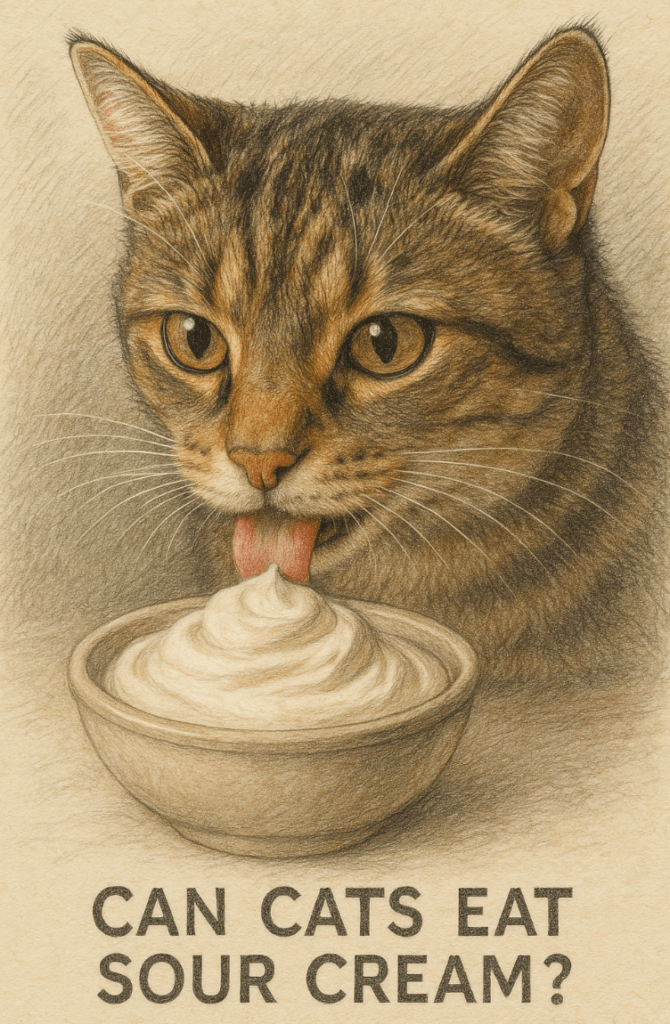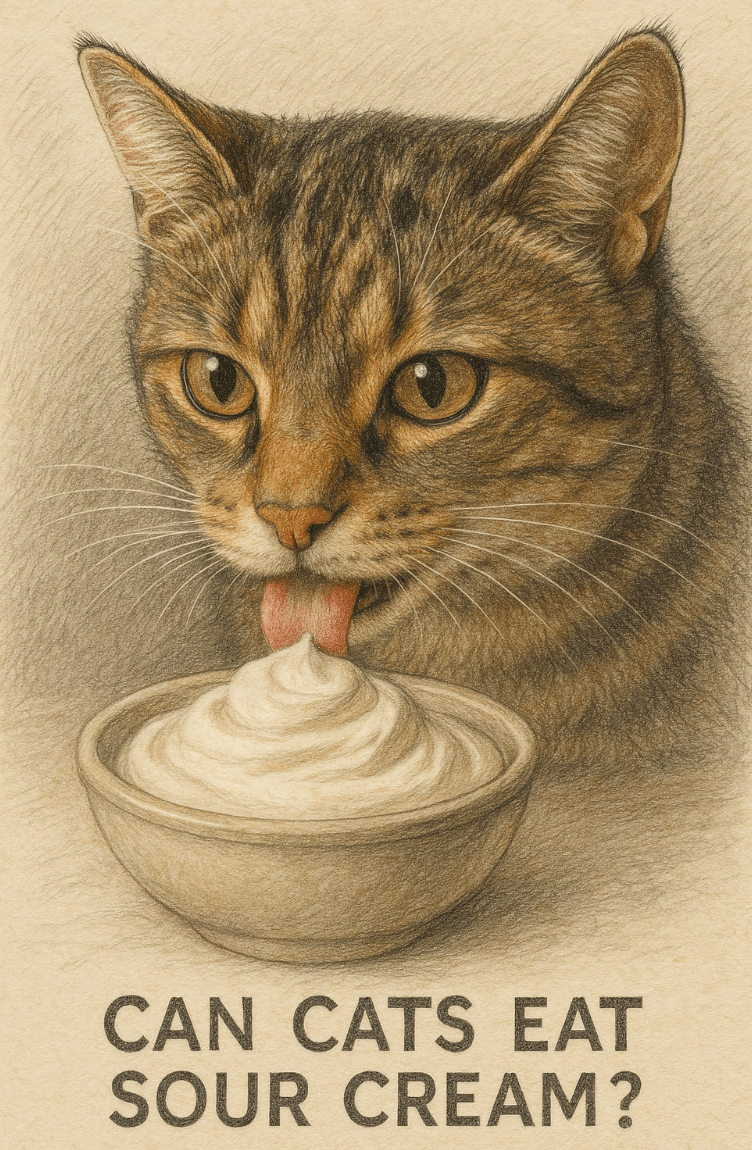Can Cats Eat Sour Cream?
As cat owners, we often find ourselves wondering whether certain human foods are safe to share with our feline companions. One such food is sour cream—a creamy, tangy treat that many of us enjoy. But can cats eat sour cream? While it might seem harmless to let your curious kitty lick a bit off your plate, understanding the potential risks and benefits is crucial for their health and well-being. In this blog post, we’ll explore whether sour cream is safe for cats, its nutritional implications, and safer alternatives to satisfy your cat’s taste buds.
Potential Risks of Feeding Sour Cream to Cats
While sour cream isn’t toxic to cats, it does come with several risks that every pet owner should be aware of. These hazards can affect your cat’s digestive system and overall health.
High Fat Content:
Sour cream contains a significant amount of fat, which can upset your cat’s stomach and lead to vomiting or diarrhea.Lactose Intolerance:
Most adult cats are lactose intolerant, meaning they lack the enzyme needed to digest dairy products like sour cream properly.Weight Gain and Obesity:
Regular consumption of high-calorie foods like sour cream can contribute to unhealthy weight gain in cats.Nutritional Imbalance:
Sour cream offers no essential nutrients for cats, making it an empty-calorie snack that could disrupt their balanced diet.Additives and Preservatives:
Store-bought sour cream may contain additives, salt, or artificial flavors that can harm your cat’s sensitive system.
These risks highlight why sour cream should only be given in moderation, if at all, and never as a regular part of your cat’s diet.
Signs Your Cat May Be Sensitive to Sour Cream
If you’ve already given your cat sour cream, watch for these signs that indicate they may not tolerate it well. Early detection allows you to act quickly and prevent further issues.
Upset Stomach:
Symptoms like vomiting or diarrhea are common reactions to lactose intolerance or high-fat foods.Excessive Gas:
Digestive discomfort from sour cream can cause excessive gas, leading to bloating and restlessness.Loss of Appetite:
If your cat refuses to eat after consuming sour cream, it could signal nausea or an upset stomach.Lethargy or Weakness:
A sudden lack of energy may indicate that your cat is feeling unwell due to digestive distress.Skin Irritation or Itching:
In rare cases, cats may develop allergic reactions to dairy products, resulting in skin issues.
Recognizing these signs early ensures you can take appropriate action, such as consulting your veterinarian, to keep your cat healthy.
Check this guide 👉Can Cats Eat Brussels Sprouts? Best 7 Expert Tips!
Check this guide 👉Can Cats Eat Chia Seeds? Best 7 Expert Tips!
Check this guide 👉Can Cats Eat Arugula? Best 7 Expert Tips!

Safe Alternatives to Sour Cream | Risks of Feeding Sour Cream to Cats |
|---|---|
Plain cooked chicken (shredded) | High fat content causing digestive upset |
Pumpkin puree (unsweetened) | Lactose intolerance leading to discomfort |
Small amounts of plain yogurt (low-fat) | Risk of obesity from frequent consumption |
Bone broth (strained and unsalted) | Nutritional imbalance from empty calories |
Freeze-dried meat treats | Harmful additives in store-bought sour cream |
How to Safely Introduce Sour Cream to Your Cat (If You Choose To)
If you decide to let your cat try sour cream, it’s essential to proceed cautiously to minimize risks. Follow these steps to ensure a safe experience.
Start with a Tiny Amount:
Offer just a small lick or dab of sour cream to see how your cat reacts before giving more.Choose Plain, Unsweetened Varieties:
Avoid flavored or sweetened sour cream, as added sugars and artificial ingredients can harm your cat.Monitor for Reactions:
Keep an eye on your cat for any signs of digestive distress or allergic reactions after consumption.Limit Frequency:
Sour cream should only be an occasional treat, not a regular part of their diet.Consult Your Veterinarian:
Before introducing any new food, seek advice from your vet to ensure it aligns with your cat’s dietary needs.
By following these guidelines, you can reduce the likelihood of adverse effects while indulging your cat’s curiosity safely.
Benefits of Avoiding Sour Cream and Choosing Healthier Options
While sour cream might seem like a harmless treat, opting for healthier alternatives can provide greater benefits for your cat’s overall health.
Improved Digestion:
Foods like pumpkin puree or bone broth support digestive health without triggering lactose intolerance.Better Weight Management:
Low-calorie treats help maintain a healthy weight and reduce the risk of obesity-related conditions.Essential Nutrients:
Alternatives like cooked chicken or freeze-dried meat offer protein and other vital nutrients that sour cream lacks.Reduced Risk of Allergies:
Natural, unprocessed foods are less likely to cause allergic reactions compared to dairy-based products.Long-Term Health Benefits:
A balanced diet rich in species-appropriate foods promotes longevity and vitality for your feline friend.
Choosing healthier options ensures your cat stays happy, healthy, and thriving.
Common Mistakes to Avoid When Feeding Human Food to Cats
Feeding human food to cats can be risky if done improperly. Here are some common mistakes to avoid when sharing snacks like sour cream with your furry friend.
Assuming All Human Foods Are Safe:
Many human foods, including dairy products, can upset a cat’s delicate digestive system.Ignoring Portion Sizes:
Even small amounts of high-fat or sugary foods can harm your cat if fed regularly.Overlooking Lactose Intolerance:
Most adult cats cannot digest lactose, so dairy products often cause gastrointestinal issues.Not Consulting a Vet First:
Skipping professional advice can lead to unintentional harm from inappropriate food choices.Rewarding Begging Behavior:
Giving in to begging reinforces bad habits and encourages your cat to expect unsafe foods.
Avoiding these mistakes ensures your cat stays healthy and happy while enjoying occasional treats.
Healthier Treat Ideas for Cats
Instead of sour cream, consider these nutritious and safe treat options that cater to your cat’s natural dietary needs.
Cooked Chicken or Turkey:
Lean meats provide protein and essential amino acids without unnecessary fats or fillers.Pumpkin Puree:
Rich in fiber, pumpkin aids digestion and helps regulate bowel movements in cats.Freeze-Dried Liver Snacks:
These treats are packed with nutrients and appeal to cats’ carnivorous instincts.Small Pieces of Fish (Cooked):
Occasional servings of plain, cooked fish offer omega-3 fatty acids for skin and coat health.Catnip or Silver Vine Toys:
Non-food alternatives like catnip toys stimulate play and provide mental enrichment.
These options allow you to spoil your cat responsibly while supporting their overall health.
Understanding Your Cat’s Dietary Needs
Cats are obligate carnivores, meaning their bodies require specific nutrients found primarily in animal-based proteins. Understanding their unique dietary requirements helps you make informed decisions about what to feed them.
High Protein Requirements:
Cats thrive on diets rich in animal protein, which provides essential amino acids like taurine.Limited Carbohydrate Tolerance:
Unlike humans, cats don’t process carbohydrates efficiently, so grain-heavy foods should be avoided.Hydration Importance:
Cats naturally have low thirst drives, so wet food or hydration supplements help maintain proper water intake.Avoidance of Toxic Foods:
Certain human foods, like onions, garlic, and chocolate, are toxic to cats and must be strictly avoided.Age-Specific Nutrition:
Kittens, adults, and senior cats have different nutritional needs, requiring tailored diets for optimal health.
By catering to these needs, you can ensure your cat enjoys a balanced and fulfilling diet free from harmful ingredients like sour cream.
Frequently Asked Questions About Cats and Sour Cream
Is sour cream toxic to cats?
No, sour cream isn’t toxic, but it can cause digestive upset and other issues due to its fat and lactose content.
Can kittens eat sour cream?
Kittens have sensitive digestive systems and should avoid sour cream entirely to prevent discomfort.
What happens if my cat eats too much sour cream?
Overconsumption can lead to vomiting, diarrhea, and potential weight gain over time.
Are there any dairy products cats can eat?
Some cats tolerate small amounts of plain, low-fat yogurt, but most dairy isn’t recommended for adult cats.
What should I do if my cat accidentally eats sour cream?
Monitor them closely for signs of distress and contact your vet if symptoms persist or worsen.
Prioritizing Your Cat’s Health When It Comes to Sour Cream
While sour cream might tempt your cat with its creamy texture and tangy flavor, it’s best enjoyed sparingly—or not at all—due to the potential risks involved. Understanding the impact of lactose, fat, and additives on your cat’s health empowers you to make smarter dietary choices. By exploring safer, nutrient-rich alternatives, you can provide your feline friend with treats that truly benefit their well-being. Remember, your cat relies on you to make the best decisions for their diet—so always prioritize their long-term health over momentary indulgence.
Do Cats Have Taste Buds? Best 7 Expert Tips! – Discover how cats experience flavors and why their taste is so unique.
Do Dogs Have Taste Buds? Best 7 Expert Tips! – Discover how dogs experience taste, their preferences, and what it means for their diet and health.
Can Cats Taste Sweet? Best 7 Expert Tips! – Discover why cats can’t taste sweetness, how it affects their diet, and tips to keep them healthy and happy.
Can Dogs Taste Sweet? Best 7 Expert Tips! – Discover how dogs perceive sweetness, which foods are safe, and tips to manage their sweet cravings responsibly.





